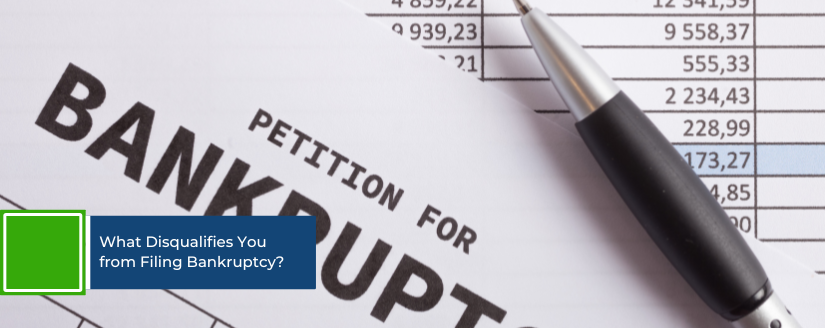What Disqualifies You from Filing Bankruptcy?

People who cannot afford to repay their debts may pursue bankruptcy to obtain financial relief and a fresh start. However, both Chapter 7 and Chapter 13 bankruptcy have specific rules, and various factors may disqualify you from filing. Here’s a closer look at what disqualifies you from bankruptcy.
Common Reasons You May Be Disqualified from Filing Bankruptcy
Some of the top reasons why you might become disqualified for filing for bankruptcy include:
- You Earn Too Much Money (Chapter 7 Only) – A person cannot file for Chapter 7 bankruptcy if their average monthly income is sufficient to pay down their debts under a Chapter 13 bankruptcy repayment plan.
- You Filed Bankruptcy Too Recently – Bankruptcy law places time limits on filing a subsequent bankruptcy petition after completing a prior bankruptcy or having a prior petition dismissed by the bankruptcy court.
- You Committed Bankruptcy Fraud or Dishonesty – The bankruptcy court may dismiss a petition from a debtor who had a prior petition dismissed due to fraud or perjury.
- You Didn’t Complete Required Credit Counseling – Debtors must complete a credit counseling course before filing for bankruptcy, and include a copy of their completion certificate with their bankruptcy petition.
- Your Debts Don’t Qualify or Are Exempt from Discharge – A person might not qualify for bankruptcy if they only have non-dischargeable or non-restructurable debts since the bankruptcy court cannot afford that person any relief.
Do These Disqualifiers Apply to Chapter 13 Too?
Many reasons for disqualifying a debtor from Chapter 7 bankruptcy also apply to Chapter 13 bankruptcy. Chapter 13 bankruptcy also has time limits on applying for bankruptcy after a prior completed bankruptcy or a dismissed bankruptcy petition. Chapter 13 filers also must complete credit counseling from an approved credit counseling agency before filing for bankruptcy. Chapter 13 requires debtors to have current monthly income that can support debt repayments under a repayment plan. Chapter 13 bankruptcy also limits the total amount of debt a person may have. However, debtors with larger debt loads may qualify for Chapter 11 bankruptcy.
What to Do If You’re Not Eligible – Know Your Options
Debtors who do not qualify for Chapter 7 or 13 bankruptcy may have other options for debt relief. For example, a person who does not qualify for Chapter 7 may qualify for Chapter 13. Debtors with a recent bankruptcy case can wait the required time to refile their petition. An experienced bankruptcy lawyer can help you assess your eligibility.
FAQs
Common questions people have about qualifying for bankruptcy include:
What income disqualifies you from Chapter 7 bankruptcy in Ohio?
Chapter 7 bankruptcy uses a “means test” to determine whether a debtor has a disqualifying level of income. The test factors in a person’s income, expenses, and debts to evaluate their ability to repay creditors. Most debtors with an income below the median income for their household in Ohio will qualify for Chapter 7.
Can bankruptcy be denied after filing?
The bankruptcy court can dismiss a petition if a debtor fails to comply with court orders or if the court finds that a debtor has provided false or misleading information to obtain bankruptcy relief.
Can you file for bankruptcy if you have a job?
Employed individuals may qualify for both Chapter 7 and Chapter 13 bankruptcy. Furthermore, Chapter 13 bankruptcy requires a steady income.
How often can you file for bankruptcy in Ohio?
The waiting periods between bankruptcy filings depend on the previous type of bankruptcy relief a person pursued and the type of bankruptcy they wish to file for. After filing for Chapter 7 bankruptcy, a person must wait eight years to file another Chapter 7 bankruptcy petition or four years to file for Chapter 13 bankruptcy. After filing for Chapter 13 bankruptcy, a person usually must wait six years to file for Chapter 7 or can wait two years to file another Chapter 13 bankruptcy.
What debts can’t be discharged in bankruptcy?
Bankruptcy law prohibits the discharge of certain types of debts, including student loans, child/spousal support arrears, and unpaid taxes.
Talk to an Ohio Bankruptcy Lawyer Before You File
Before filing for bankruptcy, an experienced bankruptcy attorney can help you determine which types of bankruptcy you might qualify for and what the bankruptcy process entails. Contact Amourgis and Associates, Attorneys at Law, today for a free initial consultation to discuss your options for filing a bankruptcy case.







